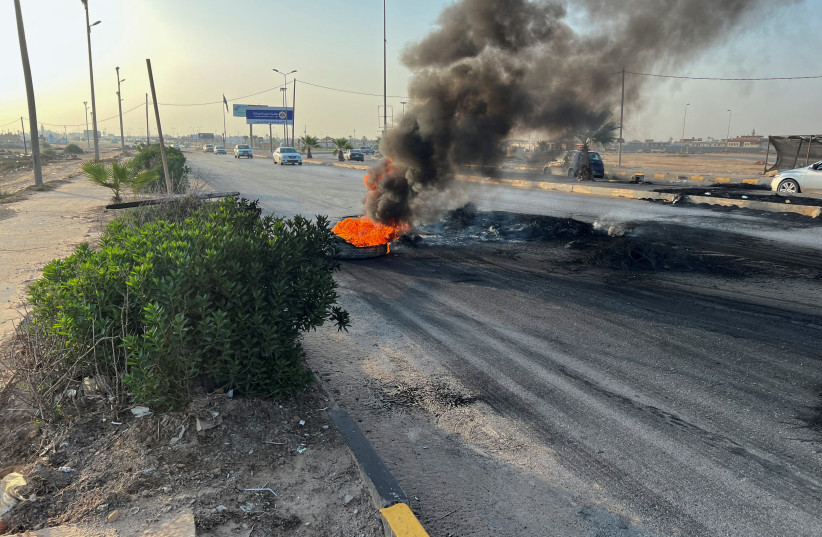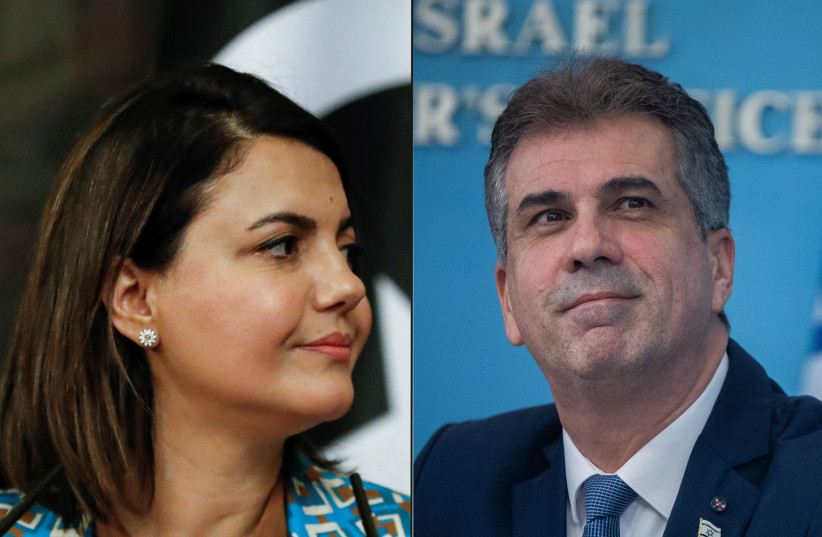How will Israel’s diplomatic snafu with Libya impact the Arab world?
The fallout from the meeting between Israel’s Foreign Minister Eli Cohen and Libya’s Government of National Unity Foreign Minister Najla Mangoush has been greeted in the Middle East with intense interest and scrutiny.
While news of Israel normalizing with various countries is not new since the Abraham Accords and the near-daily reports of the possible emergence of an Israel-Saudi Arabia deal brokered by the US, the Israel-Libya controversy appears to be a throwback to an era when Israel ties were seen in a more controversial light.
It is a reminder that some countries continue to have populists who use anger at Israel to achieve their goals.
Libyans burn Israeli flags in protest of secret meeting
After Israel announced that Cohen had met the Libyan diplomat, she was suspended and reports on Arab news say she was referred for investigation. “Prime Minister Abdulhamid Dbeibah issued the suspension order following a backlash, with the country’s Presidential Council, which functions as head of state, demanding clarification.”
The report notes that the High State Council, which holds an advisory role in Libyan politics, also voiced its “surprise.”
 Tires burn on the road as people protest against the meeting which was held last week in Italy between foreign affairs ministers of Libya and Israel, in Tripoli, Libya, August 28, 2023 (credit: REUTERS/AYMAN AL-SAHILI)
Tires burn on the road as people protest against the meeting which was held last week in Italy between foreign affairs ministers of Libya and Israel, in Tripoli, Libya, August 28, 2023 (credit: REUTERS/AYMAN AL-SAHILI)Now, there are calls for her to be fully sacked and also people are protesting. Some Libyans on Sunday night even made Israeli flags and then tried to burn them to show their displeasure. The Dbeibah is already under pressure from the UN and other forces because it has refused to hold elections and the country remains divided. As such the current controversy may shake what remains of confidence in Tripoli and also be the last thing the government needs as it deals with other crises.
The real story can be judged by the media coverage in the region. Many media are linked to state media so the media in the region can be seen to reflect the interests of the rulers as well as some of the people. Arab News put the controversy on its homepage on Monday.
This report says that the government in Tripoli has said that this was an “unprepared casual” meeting. It took place in Italy and therefore the Libyans are distancing themselves from it.
It is important to note that Libya has been divided since the fall of Qadaffi in 2011. Western Libya is dominated by the GNU or national unity government in Tripoli. Benghazi and eastern Libya are run by Khalifa Haftar. Haftar has seen support from Egypt, Russia and other countries over the years, meaning that Libya’s politics are not a simple story. Turkey sent forces to western Libya several years ago and Ankara is seen as one of the power brokers in Tripoli.
Nevertheless, even this understanding of Libya is not so simple; many actors play a role in the country and there are many competing agendas. Recent news had said that Haftar, for instance, was involved in intrigue in Chad. The Gulf states are very interested in Libya.
Why is Libya downplaying talks of an Israeli normalization?
Therefore, it is worth considering that some Gulf states may prefer some kind of normalization with Israel and Libya eventually; and Turkey has also reconciled with Israel, meaning it may not view this as controversial. However, the Libyan rulers in Tripoli now want to downplay the reports to regional media.
Arab News highlights Italy’s role. Italy has recently done new outreach to the Gulf and Saudi Arabia. Italy has done outreach to Tunisia, which neighbors Libya in recent months. In addition, last year Libya’s Dbeibah visited Tunisian leader Kais Saied. Italy’s leader Prime Minister Giogia Meloni spoke with Saudi Arabia’s Crown Prince in July.
Whereas Arab news has highlighted the fallout from the Israel-Libya meeting, the National and Al-Arabiya have not been as interested in it. TRT has reported the incident only in a minimal way, showcasing that Ankara is waiting to see which way the wind blows on this. Turkey’s state media TRT last headline linked to Israel and Libya noted four years ago that Haftar had “secret ties with Israel” that were fueling chaos, a memory of the era when Ankara decided to get involved in Libya and was backing Tripoli against Haftar and when Turkey had colder relations with Israel.
Al-Ain media in the Gulf also highlighted the controversy, noting that this had resulted in the Libyan diplomat being “overthrown.” This report also said the meeting was “informal” and portrayed it has happening in an unprepared manner when the Libyan top diplomat was meeting her Italian counterpart. Al-Ain claimed that “she explained that the meeting ‘did not include any discussions, agreements or consultations. Rather, the minister affirmed Libya’s constants towards the Palestinian issue in a clear and unambiguous manner.’” This report also noted that the Dbeibah government is “outgoing.” It claimed that Youth Minister Fathallah Abdel Latif was assigned to run the work in the foreign ministry temporarily. “The decision included the formation of an investigation committee headed by the Minister of Justice and with the membership of the Minister of Local Government and the Director of the Legal Affairs and Complaints Department in the Council of Ministers. The committee shall transmit a report of the results of its work to the Prime Minister within a maximum period of three days” about the case.
Al-Mayadeen media, which is seen as pro-Iran, also claimed that Mangoush had to “flee” Libya and fly to Turkey. Oddly, Al-Mayadeen’s link to its own article was not working as of press time. Anadolu media in Turkey reported that protesters had set fire to Dbeibah’s residence in the Shatt al-Hanshir area of Tripoli. The House of Representatives apparently called an “emergency” session and that Mangoush had flown to Istanbul “on a Libyan government plane with assistance from the Internal Security Agency.” Websites in Libya such as AlWasat Libya tracked the apparent flight. There has now been a “fatwa” released in Italy as well, the Libya Observer noted.
Libyan FM Mangoush’s history prior to Israeli controversey
Prior to the current controversy, Mangoush had carried out important work for the unity government in Tripoli. However, this work was not without disputes at home. She had met with Turkey’s powerful foreign minister Hakan Fidan in late July. She also went to Tehran for talks, an important outreach effort for Libya. This was the first high-level visit in 16 years. This was a shift from her position back in 2021 when she had said Turkey should withdraw forces from Libya. After pressure, she also said that Russia and others should withdraw.
She was actually suspended as foreign minister back in November 2021 by the Presidential Council for her “mismanagement” of the foreign affairs file. Dbeibah rejected this critique. She earned the ire of some conservatives and pro-Ankara voices back then such as Grand Mufti Sheikh Sadiq Gharyani. In November 2022 she critiqued Greece’s foreign minister for landing in Tripoli but then continuing on to Benghazi without meeting anyone.
She has condemned Russia’s invasion of Ukraine and done outreach to Algeria and other countries. In 2021 she said, “Libya’s stability is inevitable, no matter the cost, and there is no stability without full sovereignty over all Libyan territories.”
 Libyan Foreign Minister Najla Mangoush (left) and Israeli Foreign Minister Eli Cohen (credit: MAXIM SHIPENKOV/POOL VIA REUTERS/FILE PHOTO, YONATAN SINDEL/FLASH90)
Libyan Foreign Minister Najla Mangoush (left) and Israeli Foreign Minister Eli Cohen (credit: MAXIM SHIPENKOV/POOL VIA REUTERS/FILE PHOTO, YONATAN SINDEL/FLASH90)Dbeibah has been close to Turkey in the past. His term expired last year. He has said that the international community will work to prevent fighting from growing in Libya even though the country has many competing factions and armed gunmen often act with impunity in Tripoli. Nevertheless, dozens were killed in clashes in Tripoli in mid-August, which illustrates how weak the control of the current Tripoli government is at home. Parliament declared in 2022 that Dbeibah’s term had expired when elections did not take place in December 2021. He claims his term will continue until elections take place.
In the past, the UN has called for the country to be unified before elections and the UN has backed the Dbeibah government as it clings to power. However, reports said last week that “after calling for elections in Libya ahead of government unification for years, the United Nations now says unification should come before voting. Its Libya envoy, Abdoulaye Bathily, said on Tuesday that it is imperative stakeholders agree on a unified government that could then lead Libya into elections,” Al-Jazeera said.
The meeting with Israel may be a controversy that undermines the Tripoli government and contributes to chaos and it also may be the last thing the ruling parties need now, considering their other challenges.





Comments are closed.